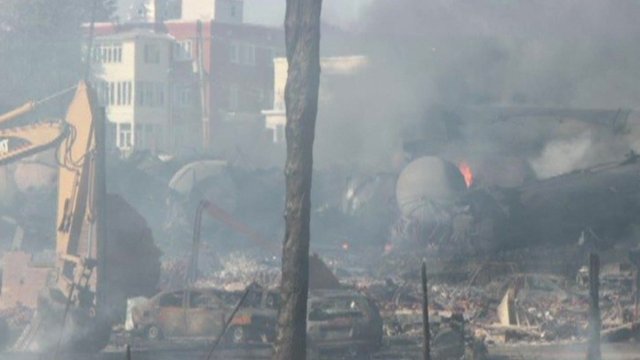Canadian authorities have launched a criminal inquiry into the derailment of an oil train that killed at least 15 people in the small Quebec town of Lac Megantic on Saturday.
Quebec police inspector Michel Forget said investigators had found evidence leading them toward a criminal probe.
The runaway train derailed in the town of Lac-Megantic, exploding and destroying dozens of buildings.
Investigators are focusing on whether the brakes were released as it was parked in a town several miles away.
Inspector Michel Forget said investigators had ruled out terrorism as a motive for the attack but that several other options, including criminal negligence, remained under consideration.
He warned it could take time before the investigation findings emerge.
“This is an enormous task ahead of us,” the police inspector said.
“We’re not at the stage of arrests.”
In addition to the dead, as many as 35 others remain unaccounted for. Authorities have asked the relatives of the missing to provide DNA samples by bringing in toothbrushes, hairbrushes, razors and other items.
But the authorities have also warned some of the bodies may have been burnt to ashes in the explosion and may never be recovered.
On Wednesday, the chief executive of the train’s US owner, Rail World, was due to visit Lac-Megantic, where he could face a hostile reception.

In media interviews Edward Burkhardt said he thought he would have to wear a bullet-proof vest when he arrived in the town.
The train, carrying 72 cars of crude oil, was parked shortly before midnight on Friday in the town of Nantes about seven miles away.
An engineer apparently left the train with four of its five locomotives shut down, but kept the final one running to ensure the brakes were engaged.
Soon, a Nantes fire crew was summoned to put out a blaze on the train.
The train’s brakes appear to have failed soon after. It began moving downhill on the track in an 18-minute journey, gathering speed until it derailed in Lac-Megantic and exploded.
“The extent to which [the fire] played into the sequences of events is a focal point of our investigation,” Transportation Safety Board investigator Donald Ross said.
Nantes Fire Chief Patrick Lambert said that his crews had shut down the final locomotive while tackling the initial blaze.
He said this was the standard operating procedure agreed with the train company, Montreal, Maine & Atlantic Railway (MMA), which is owned by Rail World.
“The people from MMA told us, <<That’s great – the train is secure, there’s no more fire, there’s nothing anymore, there’s no more danger>>,” the fire chief said.
“We were given our leave, and we left.”
But MMA says the decision to shut off the locomotive to put out the fire could have disabled the brakes.
At least 30 buildings were destroyed by the fireball that resulted from Saturday morning’s explosion, including a store and the public library.
But the entire town centre is being treated as a crime scene, with several additional streets cordoned off by police tape.
Some 200 officers were still conducting search operations on Wednesday morning. But police said the effort was taking a toll on some crewmen and two people had to be taken off the search over worries for their physical condition.
“This is a very risky environment,” said Quebec Provincial Police Sgt Benoit Richard.
“We have to secure the safety of those working there. We have some hotspots on the scene. There is some gas.”
Maude Verrault, a waitress at the Musi-Cafe, a nightspot razed by the blast, was outside smoking when she spotted the runaway train.
“I’ve never seen a train moving so fast in my life, and I saw flames,” she told the Associated Press news agency.
“Then someone screamed, <<the train is going to derail!>>. And that’s when I ran.”
The train was carrying oil from the Bakken oil region in the US state of North Dakota, taking it to a refinery on the east coast of Canada.
[youtube aPVRRgAtL4A]
